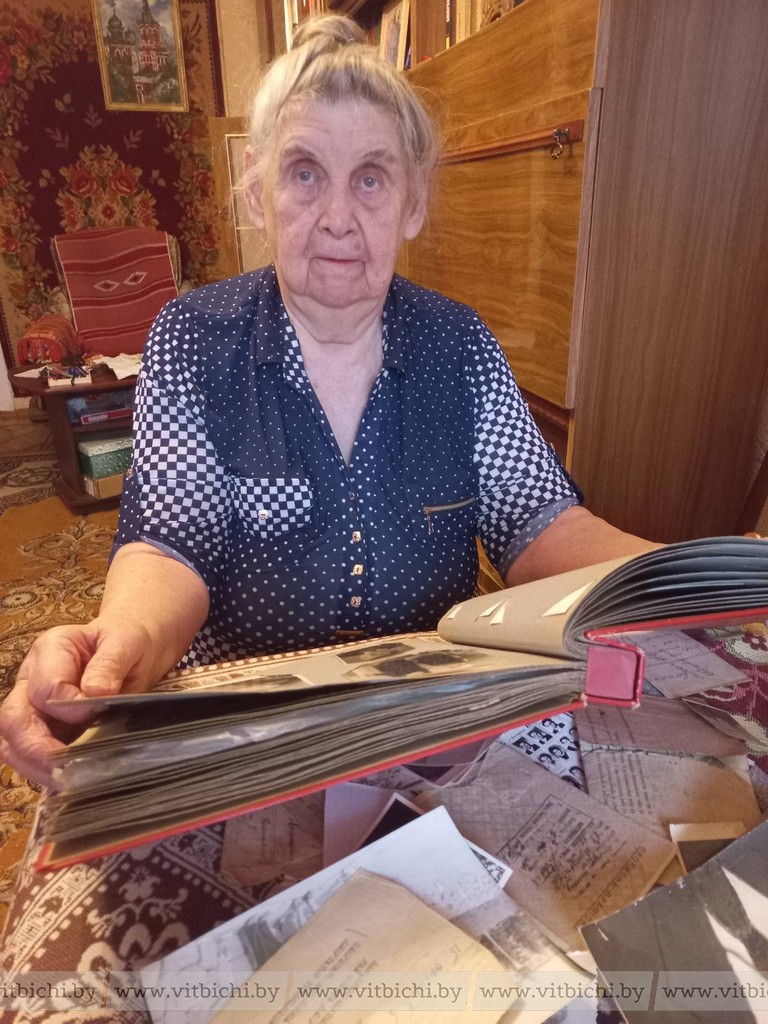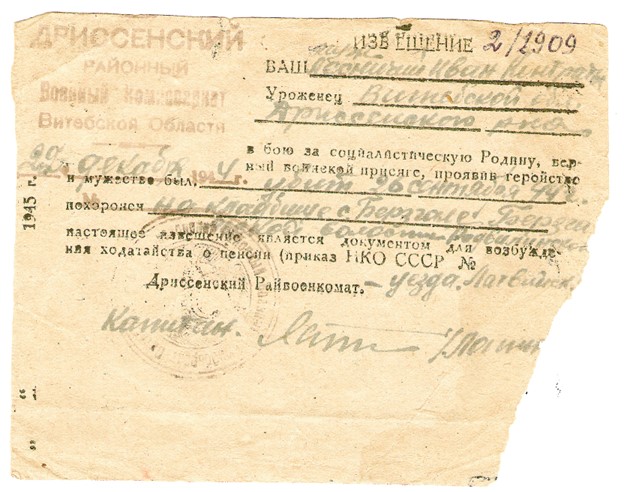How the editors of "Vitbichi" were entrusted with a sacred family heirloom. The story of Vera Batalko's family

From the envelope sent to our newspaper by Vitebsk resident Vera Batalka, a small piece of paper suddenly fell out, yellowed with time, on which some numbers and words written in ink were visible: "Drissa District Commissariat... September 26, 1944... killed..."
Funeral notice. The editors were entrusted with a sacred family heirloom.

To her large, detailed and very touching letter, Vera Ivanovna also attached a small note in which she explained: "I wrote to you so that Belarusians - who remembered, and who realized for the first time (this applies to young people) what grief the war brought us - would think again and again about the value of peace and tranquility." And she also wrote: "And, please, after the possible publication of my story, I beg you to return me the funeral notice for my father - this is all that remains of him"....
"Tribune of the Revolution"
"I want to start the history of my family (at least what I know for sure) with the "tribune of the revolution," we read in Vera Batalko's letter. "This was the name of my grandmother's brother (on my father's side) Kuzma Kuznetsov. And not only for the fact that he established Soviet power in the Zaronovo village council. According to his memoirs, Kuzma Fyodorovich was indeed an extraordinary person: a born orator, brave, uncompromising, purposeful, wholeheartedly believing in the dream of a new, happy life for all people, and with a passionate heart he took up this just cause. In a word, a devoted Leninist."
Therefore, there was no life for the enemies of the Soviet power from him. For which the bandits killed him in 1922, shooting him at point-blank range. The authority of Kuzma Fedorovich among the people was so great that after his death even the district was named after him - Kuznetsovsky! It existed until 1927, and then became part of Vitebsk. In the same year, the family of Kuzma Kuznetsov's sister moved to Leningrad (he did not even have time to start his own) - it became unsafe to stay in his native places: the "tribunes of the revolution" are terrible to enemies even after death, so they could also take revenge on relatives.
Having become Leningraders, they could not even imagine what fate awaited them. Matryona Fedorovna and her husband survived the blockade from the first to the last day. At the same time, she herself did not stop working at one of the factories for the production of weapons for the front, for the Victory, and her husband-driver delivered food to the besieged city along Lake Ladoga until the very breakthrough of the blockade.
Ah, the war, what have you, vile, done...
Another grandmother of Vera Ivanovna also left Zaronovo, only to Vitebsk, where the family built a house on 2nd Vetrennaya Street. Nadya, one of the Zalessky daughters, graduated from a pedagogical school in 1939 and was sent to the Drissa district. There is now Nadezhda Romanovna! — began working as a teacher in a rural school in Dernovichi.
"Ivan Kondratyevich Lesnichy also taught at the same school. That's how my future parents met! Vera Ivanovna writes further. "Then they moved to another village, Barsuki. And in 1940, my father also graduated from the Kalinkovichi Military School, so literally from the first day of the declaration of war, he went to the front."

About what happened to each of those who met that terrible war, probably, they will never write everything. The horrors, the unimaginable intertwining of the fates of millions of people were not just terrible, but sometimes unthinkable.
"As it turned out later, the formation of 600 people, in which my father was, was surrounded by the Nazis somewhere near Polotsk. So he was captured. My mother told me about this, already an adult. My father, together with one friend, decided to escape. With incredible efforts, they broke out several planks in the freight car in which they were taken to Germany, and, having calculated approximately when they would pass in the area of their native places, they jumped out on the move. Dad walked to Badgers, where his mother no longer hoped to meet him alive. Together they began to help the partisans, baked and passed bread, and carried out tasks."
Ivan Kondratievich still had time to see his newborn daughter: he himself was looking for a grandmother-midwife in the area! And soon, with the troops of the Soviet army he met, he went to fight further. Ivan Lesnichy died on September 26, 1944 in the battles near Riga.
She died twice
Nadezhda Romanovna gave birth to Verochka on April 1, 1943. And on April 26, the Nazis entered Barsuki and set fire to the houses of the villagers, including the Foresters. A three-week-old girl survived by a miracle - she was "saved" by a carpet that hung on the wall. But on this day, the infant still almost died...
"The occupiers rounded up the entire population of the village," Vera Batalko recalls further. "They dealt with people as soon as they wanted. My mother was also in the place of the massacre with me in her arms. The German officer snatched the child, raised it on a bayonet and wanted to throw it into the fire. But my mother taught German before the war, and she began to beg, beg to give her the child, to leave him alive. The German was inexpressibly amazed to hear his native speech. Maybe that's why he threw me at my mother's feet with a snide grin, while not failing to kick her with his boot."
Trouble does not walk alone
Anyone who survived that terrible war could say so. The second brother of his father also died, the third was taken into slavery in Germany at the age of 14. Nadezhda Romanovna's father and mother were also taken there. And when she and Verochka decided to return to Vitebsk, to her parents' house on 2nd Vetrennaya Street, she was greeted only by ashes.
"We lived in a dugout. Then my mother found a job in Dolzh, where they gave me a room, probably no more than 12-14 square meters. For two families. We slept with my mother on the same bed, mice and rats ran right on the blanket. The cold was so cold that snow was shoveled from the walls, water froze in the bucket, there was not much to heat with," Vera Batalko writes further. "We've been wandering around in other people's corners for a long time. My mother was transferred to Luzhesno, where she taught visually impaired children, orphans, and overgrown wartime children. They lived in a private apartment - also small and dark. My mother received 600 rubles, 120 of which she gave for housing."
And then Nadezhda Romanovna decided: at all costs, I will build my own house! She saved from her salary and Vera's meager pension for her deceased father, built it with incredible efforts, and yet they had their own corner in 1952. Vera was already in the third grade. And although we drove into a house without a roof and gables, it seems that it was then that it seemed for the first time that the war was over, everything would be forgotten...

In fact, the hard times made themselves felt for a long time. "We studied in the premises of a former German barracks, where there was practically no lighting - one kerosene lamp burned for the whole class. But the cold especially overwhelmed me both at school and at home. After classes, my mother and I went to the forest, chopped hazelnuts and heated the stove with them. They slept in jackets, there was not enough food, clothes and even notebooks. A cow that gave a little milk saved her. So at the age of 12, I was already a "little man", I knew how to do everything: chop, stab, mow. I went to my neighbor's house and learned to sew on her machine. I bought mine only in 1962, when I was already working at the Vitebsk Radio Parts Plant. She worked in two shifts. At night, in rain or frost, she returned home on foot to Luzhesno. And what were the shoes and clothes then..."
Long Echo
And even in the best, happiest moments of life, the war reminded the elderly, and adults, and the young. At a party on the occasion of the New Year of 1965, Vera met her betrothed. But my husband's fate was no sweeter. Alexander Batalko is the same simple, poor boy, his father went missing in the war, he was raised by one mother who worked on a collective farm. She could not help her son, who studied in the city at a technical school and lived in a private apartment, receiving only nine rubles of scholarship: they were paid only in oats. It was only later, having lived a great life, that Alexander Prokhorovich recalled, smiling:
"The hostess felt sorry for my friend and me, in the morning and in the evening she fed me with a glass of rye flour grout for two. But if occasionally an old man came on foot from Beshenkovichi and brought a piece of bacon and a small basket of bulbs, oh, it was a holiday! On other days, Mishka and I tried to go around the dining room, because the smells alone used to make you faint from hunger.
"And yet, my husband received a good education, taught at the Institute of Technology. And then he helped me to study," writes Vera Ivanovna. — Since 1976, I have already worked at VZRD as a senior engineer. And then I was sent to work at one of the factories in the city of Khmelnitsky, I had to work as a representative in the BSSR from Ukraine, all Vitebsk factories were in my competence, so I lived in two houses for 11 years!"
We survived and did not give up!
We still met Vera Batalko! Firstly, it was necessary to keep her word and return, as she asked, a family heirloom dear to her - a funeral notice for her father. And secondly, I wanted to personally meet this woman, our regular reader, who, at the age of 82, tells so wonderfully, thinks a lot about what is happening in today's life. She never ceases to be concerned about the mood of the young.
"You can talk and cry endlessly about the hardships in which you have spent your life. My husband and I, as well as our generation in general, had such a difficult fate, everything was given to us by our own work. But we survived! They survived and did not give up. We have become worthy people of our state," says Vera Ivanovna. "The war stole our childhood, my father died for the freedom of Latvia, my uncle for Russia. How much kind, useful, fraternally selfless we have done for the Ukrainian economy in our time. After all, all this was not in vain?
Saying goodbye, my interlocutor said very touching words:
"The tears of the children of war still do not dry out. So would today's young people really want to repeat our fate? I would wish the children of the whole Earth that they would never receive a funeral notice..."


